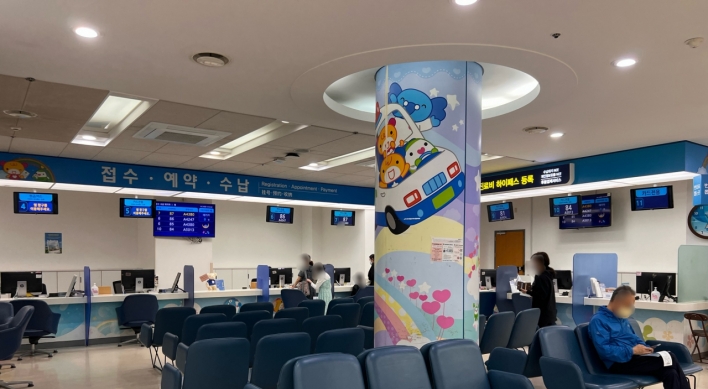Park to bring out underground economy
Tax authorities’ greater access to financial transaction info is key to uncovering underground economy
By Korea HeraldPublished : Dec. 23, 2012 - 19:17
A key plank of President-elect Park Geun-hye’s fiscal policy is to bring out the underground economy into the open to help finance increased welfare spending.
Several administrations since 1992 have attempted to get to the bottom of the nation’s underground, or shadow, economy ― the illegal, unreported, unrecorded and informal economy that is not included in the official GDP ― but failed.
The tax authorities’ increased access to financial information is the key to successfully uncovering the shadow economy which is believed to amount to around 372 trillion won, or more than a fifth of the GDP.
Park as a lawmaker has shown keen interest in the untaxed economy and her close associates, Saenuri Party floor leader Lee Han-koo and Rep. Ahn Jong-beom, are fully aware of how massive it has become.
It is an international trend to rigorously track down the flow of underground funds.
A number of advanced nations tightened taxation to tide over their fiscal debts as was seen in the cases of multinational corporations such as Starbucks and Google that tried to evade taxes in England.
Park’s camp estimates that Seoul can collect about 1.6 trillion won more in annual taxes if it can unearth financial information on just a part of the shadow economy that amounts to 6 percent of the GDP.
By strengthening taxation on the unreported incomes of high-income individual proprietors such as dentists who run their own clinics and large conglomerates, Saenuri plans to collect an additional 1.4 trillion won in annual tax revenue.
Combining the two ― taxes from the underground economy and from unreported incomes of individual proprietors and conglomerates ― would earn the government 15 trillion won in tax revenue over five years to finance increased welfare spending, according to Saenuri.
The shadow economy, which encompasses criminal activities, tax evasion and avoidance as well as unreported incomes, is estimated to account for between 19.2 percent and 28.8 percent of Korea’s GDP.
Tax avoidance in the underground economy leads to not only reduced tax revenues, but also increased tax burdens on ordinary taxpayers, more costs for social supervision, discourages the desire to work, widens the income gap and worsens corruption among public officials.
According to Friedrich Schneider, a professor at Austria’s Johannes Kepler University of Linz, Korea’s shadow economy accounted for 27.6 percent of the nation’s GDP, therefore relatively huge compared to the U.S. (7.9 percent), Japan (8.8 percent), Britain (10.3 percent) and France (13.2 percent).
Since Korea’s GDP amounts to 1.55 quadrillion won, 24 percent (estimation by others) of it would be 372 trillion won.
The underground economy takes up so much of Korea due to high rates of cash payments, individual proprietors whose income is often nontransparent, high-income earners’ tendency to evade taxes, corruption and widespread private financing.
Starting with the real-name financial transaction system in the early 1990s, the government has expanded the use of credit cards, issued cash receipts and tax invoices in a bid to uncover the hidden economy.
The measures had limited effect, however, in reducing the underground economy because the country’s taxation infrastructure was still based mostly on non-financial transactions in which both money and goods are traded, when financial transactions in which only money is traded, such as loans and stock investments, greatly increased.
Korea’s tax authorities recognize about 4 quadrillion won in annual non-financial transactions, but the annual size of transactions in the country’s financial markets amount to 60 quadrillion won, 225 trillion won on average daily.
“Korea must quickly establish a taxation infrastructure focused on financial transactions, since the current system lacks the resources to hunt down chronic tax evasion schemes such as underreporting of cash transactions as well as up-to-date tax evasion methods,” said Kim Jae-jin, senior researcher at the Korea Institute of Public Finance.
The Financial Intelligence Unit’s access to financial transaction information is limited to violations of laws and inquiries to confirm violations of laws.
In advanced nations, tax authorities are widening access to financial transactions.
In the U.S., Britain, Australia and Ireland, national tax authorities can directly access the FIU information networks. In 17 countries including Germany and Spain, they can collect information through financial institutions.
Lawmakers led by Rep. Lee had pushed for a revised bill last year to allow the National Tax Service to use FIU information for taxation, but the bill was deferred due to concerns of private information leaks.
The NTS expects the problem to be solved under the Park administration.
“We must be able to have greater access to FIU information in order to resolve problems like accounts and stocks under borrowed names,” said an NTS official.
“Seems like the president-elect is determined to shed light on the shadow economy and her policy brains are also strongly devoted to strengthening the access to financial transaction info.”
By Kim So-hyun (sophie@heraldcorp.com)
Several administrations since 1992 have attempted to get to the bottom of the nation’s underground, or shadow, economy ― the illegal, unreported, unrecorded and informal economy that is not included in the official GDP ― but failed.
The tax authorities’ increased access to financial information is the key to successfully uncovering the shadow economy which is believed to amount to around 372 trillion won, or more than a fifth of the GDP.
Park as a lawmaker has shown keen interest in the untaxed economy and her close associates, Saenuri Party floor leader Lee Han-koo and Rep. Ahn Jong-beom, are fully aware of how massive it has become.
It is an international trend to rigorously track down the flow of underground funds.
A number of advanced nations tightened taxation to tide over their fiscal debts as was seen in the cases of multinational corporations such as Starbucks and Google that tried to evade taxes in England.
Park’s camp estimates that Seoul can collect about 1.6 trillion won more in annual taxes if it can unearth financial information on just a part of the shadow economy that amounts to 6 percent of the GDP.
By strengthening taxation on the unreported incomes of high-income individual proprietors such as dentists who run their own clinics and large conglomerates, Saenuri plans to collect an additional 1.4 trillion won in annual tax revenue.
Combining the two ― taxes from the underground economy and from unreported incomes of individual proprietors and conglomerates ― would earn the government 15 trillion won in tax revenue over five years to finance increased welfare spending, according to Saenuri.
The shadow economy, which encompasses criminal activities, tax evasion and avoidance as well as unreported incomes, is estimated to account for between 19.2 percent and 28.8 percent of Korea’s GDP.
Tax avoidance in the underground economy leads to not only reduced tax revenues, but also increased tax burdens on ordinary taxpayers, more costs for social supervision, discourages the desire to work, widens the income gap and worsens corruption among public officials.
According to Friedrich Schneider, a professor at Austria’s Johannes Kepler University of Linz, Korea’s shadow economy accounted for 27.6 percent of the nation’s GDP, therefore relatively huge compared to the U.S. (7.9 percent), Japan (8.8 percent), Britain (10.3 percent) and France (13.2 percent).
Since Korea’s GDP amounts to 1.55 quadrillion won, 24 percent (estimation by others) of it would be 372 trillion won.
The underground economy takes up so much of Korea due to high rates of cash payments, individual proprietors whose income is often nontransparent, high-income earners’ tendency to evade taxes, corruption and widespread private financing.
Starting with the real-name financial transaction system in the early 1990s, the government has expanded the use of credit cards, issued cash receipts and tax invoices in a bid to uncover the hidden economy.
The measures had limited effect, however, in reducing the underground economy because the country’s taxation infrastructure was still based mostly on non-financial transactions in which both money and goods are traded, when financial transactions in which only money is traded, such as loans and stock investments, greatly increased.
Korea’s tax authorities recognize about 4 quadrillion won in annual non-financial transactions, but the annual size of transactions in the country’s financial markets amount to 60 quadrillion won, 225 trillion won on average daily.
“Korea must quickly establish a taxation infrastructure focused on financial transactions, since the current system lacks the resources to hunt down chronic tax evasion schemes such as underreporting of cash transactions as well as up-to-date tax evasion methods,” said Kim Jae-jin, senior researcher at the Korea Institute of Public Finance.
The Financial Intelligence Unit’s access to financial transaction information is limited to violations of laws and inquiries to confirm violations of laws.
In advanced nations, tax authorities are widening access to financial transactions.
In the U.S., Britain, Australia and Ireland, national tax authorities can directly access the FIU information networks. In 17 countries including Germany and Spain, they can collect information through financial institutions.
Lawmakers led by Rep. Lee had pushed for a revised bill last year to allow the National Tax Service to use FIU information for taxation, but the bill was deferred due to concerns of private information leaks.
The NTS expects the problem to be solved under the Park administration.
“We must be able to have greater access to FIU information in order to resolve problems like accounts and stocks under borrowed names,” said an NTS official.
“Seems like the president-elect is determined to shed light on the shadow economy and her policy brains are also strongly devoted to strengthening the access to financial transaction info.”
By Kim So-hyun (sophie@heraldcorp.com)
-
Articles by Korea Herald




![[Grace Kao] Hybe vs. Ador: Inspiration, imitation and plagiarism](http://res.heraldm.com/phpwas/restmb_idxmake.php?idx=644&simg=/content/image/2024/04/28/20240428050220_0.jpg&u=)

![[Herald Interview] Mom’s Touch seeks to replicate success in Japan](http://res.heraldm.com/phpwas/restmb_idxmake.php?idx=644&simg=/content/image/2024/04/29/20240429050568_0.jpg&u=)


![[News Focus] Lee tells Yoon that he has governed without political dialogue](http://res.heraldm.com/phpwas/restmb_idxmake.php?idx=644&simg=/content/image/2024/04/29/20240429050696_0.jpg&u=20240429210658)









![[Today’s K-pop] Seventeen sets sales record with best-of album](http://res.heraldm.com/phpwas/restmb_idxmake.php?idx=642&simg=/content/image/2024/04/30/20240430050818_0.jpg&u=)